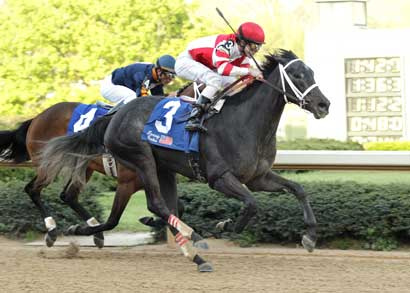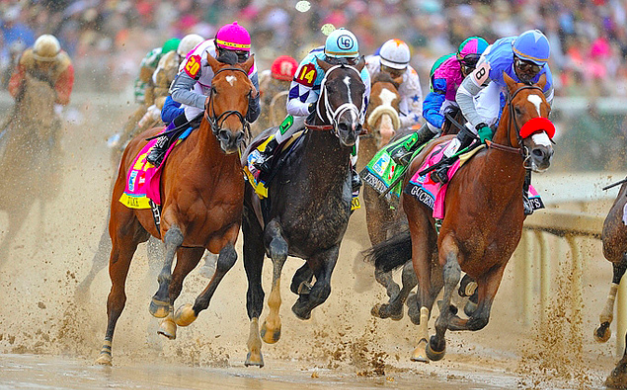The second-place horse in the 2008 Kentucky Derby, Eight
Belles, collapsed with shattered front fetlocks just after
crossing the finish line. She was euthanized on the track.
Before the race, heat shimmers off the track, an apparition dancing to the band.
NBC pans the crowd: the twin spires, the packed grandstand, red roses on a man’s boater. The wife of Big Brown’s jockey is wearing a strapless silk dress and an enormous floppy hat. Her eyes are shaded, but her breasts are not.
The marching band strikes up “My Old Kentucky Home,” and twenty thoroughbreds step onto the track, side-swiping one another, jittery. TV cameras check out the people thronging the stands, zooming in on one vacuous belle after another. They have lovely faces. But they can’t sing. They are staring down at their programs and mouthing the words, clearly uncomfortable, like tone-deaf people at church.
So many flawless bleached teeth it looks like a commercial for an orthodontist. Relief when the camera reaches a woman who doesn’t need to read the words and who sings lustily, her smile (perfect teeth and all) beautiful and true, arresting.
Weep no more, my lady, oh weep no more today!
We will sing one song for my old Kentucky home,
For the old Kentucky home, far away.
The commentator remarks that Eight Belles is the only filly running. The word “filly” reminds me of Lady Di. When her engagement was announced, her father used it to assure the royal family that she was a virgin. It was in all the papers.
Eight Belles is looking sharp: her charcoal-gray coat burnished, a white tape bridle on her forehead and muzzle. White tape on her back legs. Her tail has been brushed thick and wispy, like a fashion model’s mane, its color lightening towards the ends. Her jockey sports a scarlet helmet and a white outfit with red stripes.
Trumpets, the starting bell, like a boxing match. Thousand-pound horses explode from the gates, a turmoil of pounding hooves and gleaming muscle, lethal and beautiful, thundering down the track in a knot so tight your heart tightens for them on their champagne-glass legs. Screams, sweat, muscle, money, sex, breeding, betting. The deep roar of the crowd, like the sea.

The commentator’s voice rises, relentless as an auctioneer’s. Eight Belles is one of the frontrunners; she is pulling ahead on the inside; she is neck and neck with Big Brown. For a long minute they careen forward together, then he inches ahead, inexorable as a locomotive, and flashes over the finish line ahead of her.
When the winning jockey’s wife hugs people, she has to tuck her breasts back into their silk sheath like expensive lemons. The owner of Big Brown used to be homeless. Now he is fat, sweating and ecstatic.
There’s something happening on the track, though: men huddle around Eight Belles, ambulances arrive. No blood. She looks quite peaceful lying on her side, head up, nothing obviously wrong. The commentators are perplexed. This is off-script.
A suffragette once hurled herself under King George V’s horse and was trampled to death for women’s rights. At the Epsom Derby, 1913.
Eight bells mean your watch is over. Eight bells, but all’s not well. Eight bells are rung for funerals at sea.
Catherine Jagoe is a translator and writer; her poetry and essays have appeared in PMS, North American Review, Ninth Letter, Atlanta Review, Sow’s Ear Poetry Review, Comstock Review, Rattle and other journals.
Photo by Flickr Creative Commons user BANAMINE




